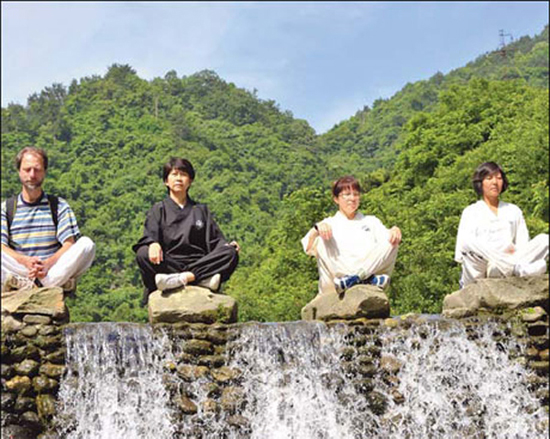|

Four foreign Taoists sit for meditation in Xiaoyao Valley on Mount Wudang.(Source: China Daily)
|
"I have progressed to the point that I am really enjoying Taoist philosophy and I'm trying to incorporate it into my life," she says.
For Raphael Robert Zanders-McNeil, a Chinese language major from San Francisco, learning Wudang kungfu has been a dream since he was a teenager when he watched a movie featuring Wudang Taoist warriors.
Zanders-McNeil has been practicing Chinese kungfu for about 10 years. His focus is Wudang jianfa, or Taoist sword techniques.
Besides the demanding routines that include "lots of kicks and difficult stances", he studies the Tao Te Ching, the supreme Taoist canon, and books about Ba Gua Zhang Boxing, a sub-branch of China's Taoist kungfu.
Asked about the benefit of practicing Wudang kungfu he says it benefits the development of one's character and body.
"Physically, you can stay healthy. It keeps your mind focused and gives you a clear awareness of your body and the environment, and of yourself and others."
Although Taoism behind Wudang kungfu is ancient Chinese wisdom, Zanders-McNeil insists that it is relevant to his life.
"The Taoist ideas have a universal meaning. It does not matter whether you come from the East or the West," he says. "If more people were exposed to the Taoist approach, the world would be a better place."
Bjarte Simon Hiley, a young man from Norway, is on a mission. When he was young, Hiley began practicing kungfu under the guidance of his mother and has studied under many kungfu masters.